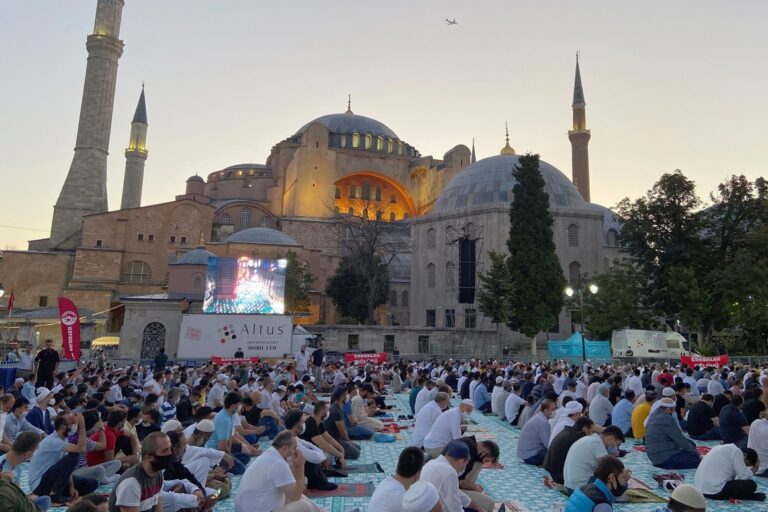In early July, however, a Turkish court overturned the law that made the Hagia Sophia a museum amid growing calls for its reconversion, allowing Erdoğan to decree the site as a mosque. The move drew condemnation from many of Turkey’s Western allies and Orthodox Christians around the world.
Christians in Turkey have taken a more cautious approach and few have spoken out. The Armenian Patriarch of Istanbul, for example, in June
supported reopening the Hagia Sophia for worship – although he suggested giving Christians and Muslims space to pray.
Vasiliadis, too, chose his words carefully. “There is a mood (among) the majority of people who applaud this decision (to reconvert Hagia Sophia) which encourages Christians who live in the city to be very careful about what they say, so that they are not not misunderstood,” he said.
Ecumenical Patriarch Bartholomew, leader of the world’s Orthodox Christians – whose official title remains Bartholomew I of Constantinople – warned before Turkey’s decision that conversion would “turn millions of Christians around the world away from Islam”.
Yet Turkey’s Christians fear the opposite is more likely.
“There is an Islamist and nationalist atmosphere which makes the situation uncomfortable for Christians in Turkey. I fear that this (conversion) will cause tensions, even if today the situation is no more difficult than a hundred years ago,” said Yetvart Danzikyan, editor-in-chief of the Istanbul-based Armenian newspaper Agos.
The Hagia Sophia decision, he said, is just the latest “nationalist measure” taken by Turkey’s conservative government. “All Christian and secular minorities are unhappy and afraid. Some young Christians are considering leaving Turkey and settling in Western countries,” he added.
Already, their numbers are constantly decreasing.
In 1914, Christians still made up about 20 percent of the population of what is now Turkey, but a series of massacres, deportations and pogroms in the first half of the 20th century – including the Armenian genocide of 1915 , during which up to 1.5 million people are believed to have died, and the Greco-Turkish conflict of 1923
population exchange — have seen their numbers decline sharply. (Ankara denies that a genocide took place.)
Today, there are an estimated 100,000 left in this country of 82 million people, including Greek Orthodox, Armenian and Syriac Christians, as well as Catholic and Protestant communities.
In Istanbul, the Greek Orthodox community now numbers only 600 families. Over the past 15 years, Vasiliadis said, his newspaper has published far more announcements of deaths than announcements of baptisms.
In the national debate, the feelings of the country’s Christians have barely been mentioned, with most criticism focusing on what conversion means for Turkey’s constitutionally mandated secularism. After all, Hagia Sophia was turned into a museum by none other than Mustafa Kemal Atatürk, the secular founder of the Turkish republic.
Few, if any, conversion advocates believe Christians can lay claim to Hagia Sophia, which became a mosque when the Ottomans conquered Byzantine Constantinople.
“If Christians want frescoes, icons or other things, they can take them. There could even be an auction to sell them to those who consider them valuable,” said Emre Çelik, a 34-year-old activist who has organized protests in favor of reopening the Hagia Sophia as a mosque this past year. last years. (Curtains now cover the precious Christian iconography of Hagia Sophia during prayer times.)
Çelik, whose WhatsApp profile picture is an image of Hagia Sophia emerging from her chains, is happy, like the majority of Turks:
survey conducted last month found that 60 percent of respondents were in favor of converting the monument into a mosque.
“I think the Orthodox community is the only one that disagrees,” he said, “but in general other Christians don’t pay much attention to this issue and view it as an internal matter of the Turkey. It is not possible to satisfy everyone with a decision.
Danzikyan, the editor-in-chief, disagrees.
“It’s not bad news just for Christians, but it’s bad news for the world,” he said. “I have always (seen) Hagia Sophia as a world heritage; I always thought it belonged to the whole world, not just Christians or Muslims. I feel pain at the thought that we have lost this world heritage.


